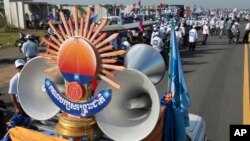Sitting in a hammock with her grandson at a gasoline stall on National Road 4 in Kampong Speu province’s Chbar Mon City, Heang Ngeth recalls joining garment worker protests along with Chea Vichea, the prominent unionist shot dead in 2004.
The 54-year-old opposition Cambodia National Rescue Party supporter, says she has decided she will abstain from the coming 2018 election following months of ruling party attacks on the CNRP. She is not alone.
Numerous opposition supporters who spoke to VOA Khmer this week said they would boycott the next general election, which some described as “meaningless” as Prime Minister Hun Sen had already ensured a ruling party victory. On November 16, the country’s Supreme Court is due to rule in a case against the CNRP that is almost certain to lead to the party’s dissolution.
The CNRP was formed in 2012 by the merger of the two leading opposition parties of the day -- the Human Rights Party, led by Kem Sokha, and the Sam Rainsy Party, headed by the former finance minister of the same name. The party did well at the 2013 general election, winning a large share of the popular vote and 55 of the 123 seats in parliament.
Mass protests at apparent vote-rigging in the election, workers conditions and a lack of political freedoms followed the election, culminating in the fatal shooting of people in early January 2014. The CNRP and Hun Sen’s Cambodian People’s Party since maintained an uneasy standoff, engaging in a rapprochement before the recent tensions started that saw the opposition re-take its seats in the National Assembly after months of negotiations.
But observers say the success of the CNRP in recent local elections, where it won almost half the popular vote and secured more than 400 commune councils, shook the ruling party into taking more drastic action. Waiting in the wings, senior military officials have also said they are willing to step in if anti-government protests are held.
Ngeth is fearful of speaking to reporters about her political views and asks that her voice not be recorded during our interview. She says despite the existence of other opposition parties in Cambodia if the government bans the CNRP she will not participate.
“If there is another opposition but it is not led by Sam Rainsy or Kem Sokha I will not vote.”
Rainsy has lived in exile in France since 2015 when the government revived an old defamation sentence he thought had been buried while he was on an overseas visit in Asia. Both he and Sokha have been charged with treason for allegedly conspiring with a foreign power to foment mass anti-government protests in what the regime calls an attempted “color revolution”.
Little supporting evidence of the existence of any such “conspiracy” has been produced, but Sokha was nonetheless arrested in early September and is being held in a rural prison awaiting trial.
Hem Lida, another CNRP voter from Samraong district, said without the CNRP the election would be “meaningless” and would do little but rubber stamp a one-party state.
“Some people are interested in rescuing our nation, but some are not, so they allow a single party to stand in the election and let that party do whatever it wants,” she said.
The election is due to be held on July 29.
Observers say the scale of the recent crackdown, which has also seen NGOs closed or barred from the country, and independent and U.S.-backed media outlets shuttered, is unprecedented in modern Cambodian history.
Should opposition politicians decide to hold firm and not accept offers from Hun Sen to switch sides, those who remain in Cambodia -- just 18 out of 55 MPs -- will be barred from engaging in politics for five years.
Sok Eysan, a CPP spokesman, said the government was a proponent of “multi-party liberal democracy” and that “if one party is gone, it doesn’t mean the remaining parties are all dead too.”
He played down the notion that a large number of voters would not turn up to polling stations if the CNRP was dissolved, saying that if 60 percent of the electorate voted it would be a success.
“In some countries, elections are held with not even 40 percent of voters taking part,” he said.
But CNRP voters disagree.
Seun, 55, a resident of Kandal province’s Ang Snoul district, said the election would be illegitimate if the ruling party presided over the elimination of the only party capable of challenging its ability to form a government. “I have been through many regimes. To be in power, they may stab and kill each other to grab power,” he said.
The European Union has warned it could take concrete action against Cambodia and called for the release of Sokha, while the United States, United Nations, and others have expressed their concern at the developments.
Sebastian Strangio, author of “Hun Sen’s Cambodia”, said in an email that while everything the prime minister has said indicates he wants to see the CNRP dissolved, the long-term plan was to ensure a CPP victory in the 2018 election “with a strengthened majority.”
For Ngeth and other CNRP stalwarts, contributing in any way to that strengthened majority is not an option.







